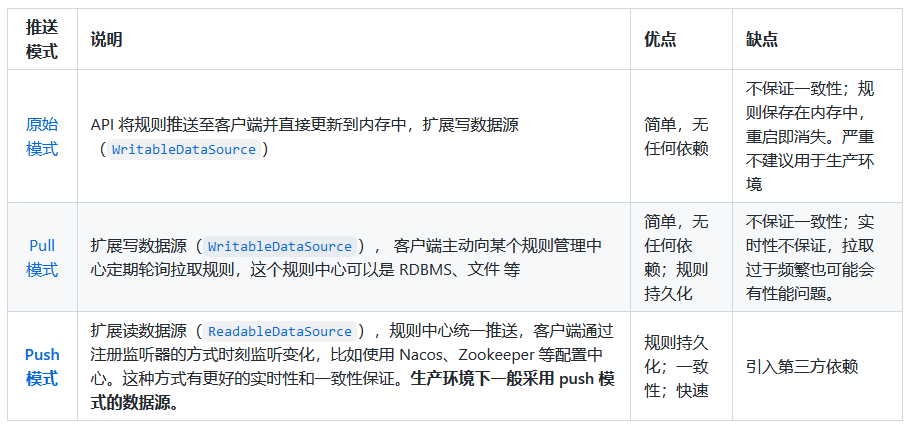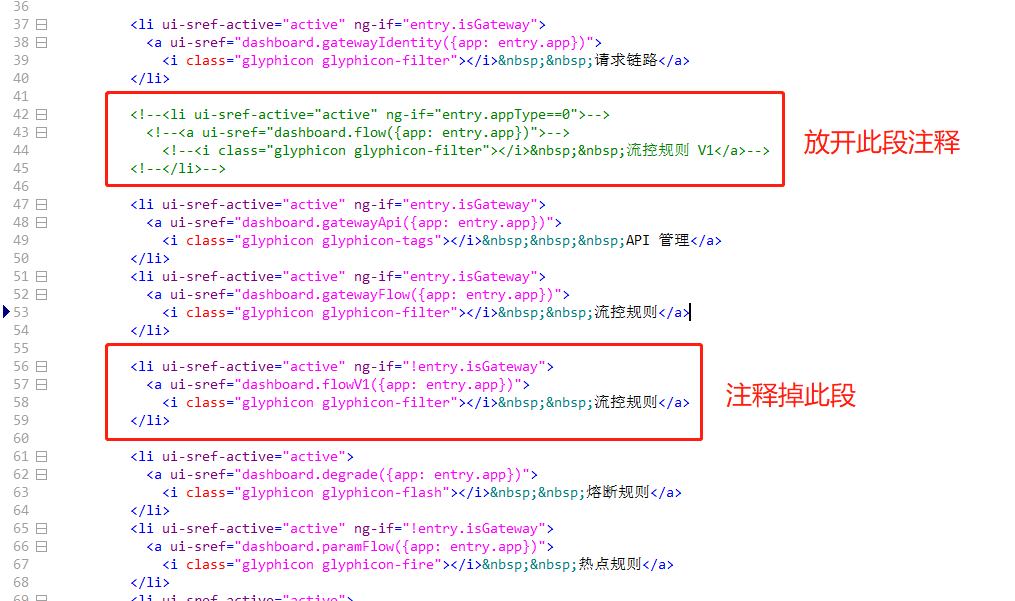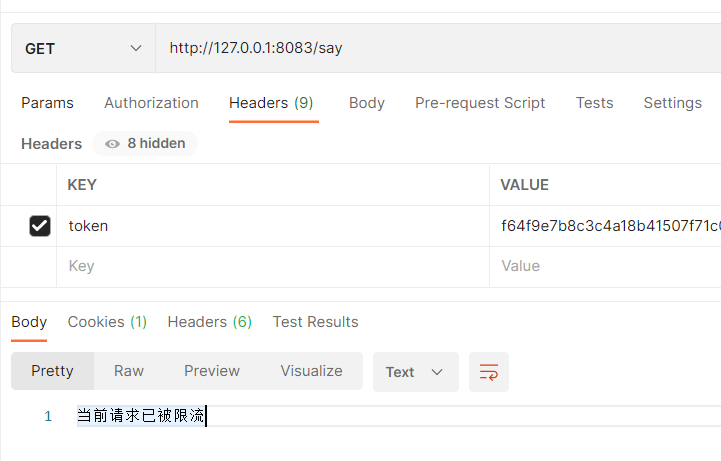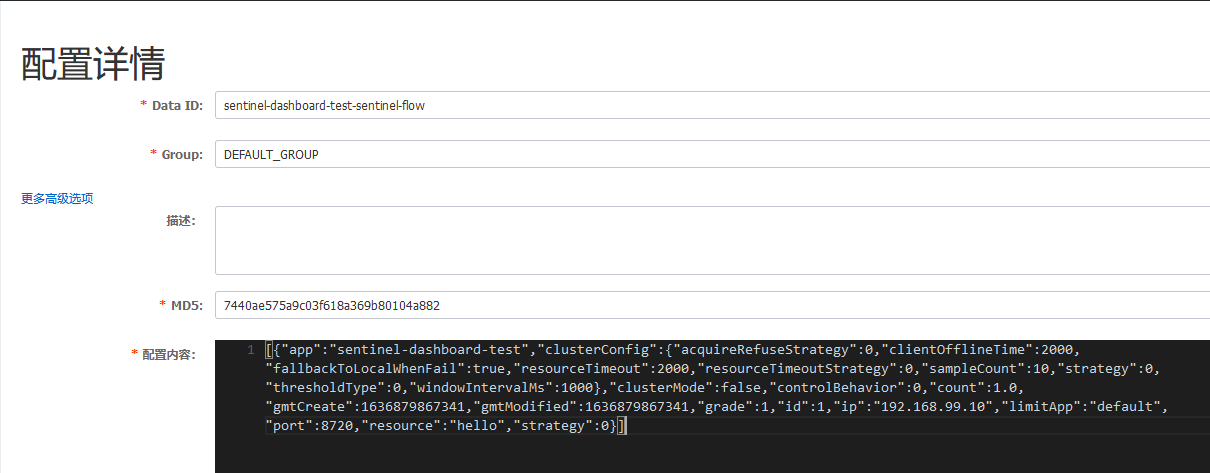SpringCloud Alibaba 改造Sentinel Dashboard将流控规则持久化到Nacos
Posted on 2021-11-14 16:59 刚泡 阅读(521) 评论(1) 编辑 收藏 举报Sentinel Dashboard集成Nacos目录:
SpringCloud Alibaba 改造Sentinel Dashboard将流控规则持久化到Nacos 本文
SpringCloud Alibaba 改造Sentinel Dashboard将熔断规则持久化到Nacos
Sentinel是阿里开源的项目,提供了流量控制、熔断降级、系统负载保护等多个维度来保障服务之间的稳定性。经历过Alibaba历届双十一的考验,其性能的卓越性肯定是不言而喻的。
Sentinel Dashboard是Sentinel提供的图形化控制台,可以通过Sentinel Dashboard维护流控规则、熔断规则、热点规则等。
然而,开源版本的Sentinel Dashboard是无法直接应用于生产环境中的,这是因为通过开源版本的Sentinel Dashboard维护的各项规则是存储于内存中的,当Sentinel Dashboard重启,则内存中的各项规则也一并丢失,这在生产上是不被允许的。
在Alibaba Sentinel的githup上,有一篇帖子在生产环境中使用Sentinel,介绍了Sentinel的三种规则管理和推送规则,
如下,而开源版本的Sentinel Dashboard使用的就是其中的原始模式,可以看到是不被推荐在生产环境中应用的。

而另外两种方式,pull模式和push模式,前者是使用诸如Nacos,利用Nacos Config的特性将Nacos作为纯粹的数据源来使用。当需要对流控规则做修改时,需要到Nacos上进行修改,然后Sentinel Dashboard拉取(Pull)Nacos Config上存储的规则并展示在Dashboard上。
此种方式下,在Dashboard上维护的规则无法直接存储到Nacos上,修改规则需要到Nacos上进行,但这样的话就无法利用Dashboard提供的图形化界面,在Nacos上维护规则也容易出错,且对人员的要求高,需要非常熟悉规则配置的参数。同时拉取模式无法保证时效性。
所以Sentinel官方推荐的方式是使用Push模式,通过Dashboard配置的规则直接可以存储在如Nacos之类的数据源上,客户端通过订阅Nacos上的配置来拉取规则配置,具体架构如官网上的下图:

这种方式好是好,但是开源的Sentinel Dashboard并未提供实现,来将配置好的规则存储于第三方的数据源中,需要直接下载Sentinel Dashboard的源代码,依据选择的第三方数据源修改代码予以实现。本文下面的内容就是介绍如何实现Sentinel Dashboard将规则推送至Nacos上,以及各个应用如何订阅Nacos上的配置实现流控的。
SpringCloud、SpringCloud Alibaba和SpringBoot三者之间有比较严格的版本依赖,在Sentinel开源版本的使用中可能会遇到各种各样的问题,这其中绝大多数是由于三者版本不匹配导致的,因此建议使用官方推荐的版本。Sentinel官网上并未详细介绍三者版本之间的关系,而是需要到githup上才能得知具体的依赖关系,介绍的网址如下:
本文使用的是如下的版本:

下载Sentinel Dashboard源代码
下载地址如下:
https://github.com/alibaba/Sentinel/,使用IDE打开sentinel-dashboard项目

一. Sentinel Dashboard集成Nacos实现流控规则持久化
Sentinel Dashboard的流控规则下的所有操作,都会调用com.alibaba.csp.sentinel.dashboard.controller.FlowControllerV1这个类,这个类中包含流控规则本地化(内存中)的CRUD操作,因此流控规则是存储在内存中的,所以每当重启Dashboard后,内存中的内容就会丢失。
而com.alibaba.csp.sentinel.dashboard.controller.v2.FlowControllerV2中同样实现了流控规则的CRUD,和V1版本不同的是,它可以实现指定数据源的规则拉取(从指定的数据源中查询已经配置好的流控规则)和发布(将通过Dashboard维护的内容存储到指定的数据源中)。
FlowControllerV2中注入了两个非常重要的类:com.alibaba.csp.sentinel.dashboard.rule.DynamicRuleProvider和com.alibaba.csp.sentinel.dashboard.rule.DynamicRulePublisher分别实现了拉取和发布动作。
这里就需要扩展这两个类,实现集成Nacos来实现Sentinel Dashboard规则的同步。
1. 首先修改Sentinel Dashboard源码中的Pom文件,把sentinel-datasource-nacos依赖的<scope>注释掉
<!-- for Nacos rule publisher sample --> <dependency> <groupId>com.alibaba.csp</groupId> <artifactId>sentinel-datasource-nacos</artifactId> <!-- 使用Nacos作为数据源,需要将scope=test注释掉 --> <!--<scope>test</scope>--> </dependency>
2. 修改html文件,使得前台维护动作可以调用V2接口
打开:/sentinel-dashboard/src/main/webapp/resources/app/scripts/directives/sidebar/sidebar.html,按照截图中的介绍修改此html代码。

打开:/sentinel-dashboard/src/main/webapp/resources/app/views/flow_v2.html,注释掉<回到单机页面>代码。注释掉此段代码的原因是,当我们修改了sidebar.html中的代码注释掉了V1版本的页面,放开了V2版本的页面后,V2版本的页面依然保留了原有的在内存中维护规则的入口,就是这个<回到单机页面>按钮。
通过点击<回到单机页面>按钮进入到的维护页面维护的规则依然是存储在内存中的,为了避免使用者的误解,故注释掉此段代码。

接下来修改簇族链路中的流控规则添加按钮:

打开:\src\main\webapp\resources\app\scripts\controllers\identity.js
修改下图红框位置的代码,将FlowServiceV1修改为FlowServiceV2。
修改前代码如下:

修改后代码如下:

3:创建DynamicRuleProvider和DynamicRulePublisher新的实现类
3.1 创建静态类,定义所需常量
/** * Nacos常量类 * @author gang.wang * 2021年11月8日 */ public class NacosConstants { public static final String DATA_ID_POSTFIX = "-sentinel-flow"; public static final String GROUP_ID = "DEFAULT_GROUP"; }
3.2 创建NacosPropertiesConfiguration类,加载application.properties中的Nacos配置
import org.springframework.boot.context.properties.ConfigurationProperties; /** * 加载Nacos配置 * @author gang.wang * 2021年10月31日 */ @ConfigurationProperties(prefix="sentinel.nacos") public class NacosPropertiesConfiguration { /** * Nacos服务地址 */ private String serverAddr; private String dataId; private String groupId = "DEFAULT_GROUP"; private String namespace; public String getServerAddr() { return serverAddr; } public void setServerAddr(String serverAddr) { this.serverAddr = serverAddr; } public String getDataId() { return dataId; } public void setDataId(String dataId) { this.dataId = dataId; } public String getGroupId() { return groupId; } public void setGroupId(String groupId) { this.groupId = groupId; } public String getNamespace() { return namespace; } public void setNamespace(String namespace) { this.namespace = namespace; } }
3.3 创建NacosConfiguration类,初始化Nacos配置
import java.util.List; import java.util.Properties; import org.springframework.boot.context.properties.EnableConfigurationProperties; import org.springframework.context.annotation.Bean; import org.springframework.context.annotation.Configuration; import com.alibaba.csp.sentinel.dashboard.datasource.entity.rule.FlowRuleEntity; import com.alibaba.csp.sentinel.datasource.Converter; import com.alibaba.fastjson.JSON; import com.alibaba.nacos.api.PropertyKeyConst; import com.alibaba.nacos.api.config.ConfigFactory; import com.alibaba.nacos.api.config.ConfigService; import com.alibaba.nacos.api.exception.NacosException; /** * Nacos配置类 * @author gang.wang * 2021年10月31日 */ @EnableConfigurationProperties(NacosPropertiesConfiguration.class) @Configuration public class NacosConfiguration { @Bean public Converter<List<FlowRuleEntity>, String> flowRuleEntityEncoder() { return JSON::toJSONString; } @Bean public Converter<String, List<FlowRuleEntity>> flowRuleEntityDecoder() { return s -> JSON.parseArray(s, FlowRuleEntity.class); } @Bean public ConfigService nacosConfigService(NacosPropertiesConfiguration nacosPropertiesConfiguration) throws NacosException { Properties properties = new Properties(); properties.put(PropertyKeyConst.SERVER_ADDR, nacosPropertiesConfiguration.getServerAddr()); properties.put(PropertyKeyConst.NAMESPACE, nacosPropertiesConfiguration.getNamespace()); return ConfigFactory.createConfigService(properties); } }
3.4 创建DynamicRuleProvider的实现类
import java.util.ArrayList; import java.util.List; import org.apache.commons.lang3.StringUtils; import org.slf4j.Logger; import org.slf4j.LoggerFactory; import org.springframework.beans.factory.annotation.Autowired; import org.springframework.stereotype.Service; import com.alibaba.csp.sentinel.dashboard.datasource.entity.rule.FlowRuleEntity; import com.alibaba.csp.sentinel.dashboard.rule.DynamicRuleProvider; import com.alibaba.csp.sentinel.datasource.Converter; import com.alibaba.nacos.api.config.ConfigService; /** * 实现从Nacos配置中心获取流控规则 * @author gang.wang * 2021年11月8日 */ @Service public class FlowRuleNacosProvider implements DynamicRuleProvider<List<FlowRuleEntity>> { private static Logger logger = LoggerFactory.getLogger(FlowRuleNacosProvider.class); @Autowired private NacosPropertiesConfiguration nacosConfigProperties; @Autowired private ConfigService configService; @Autowired private Converter<String, List<FlowRuleEntity>> converter; @Override public List<FlowRuleEntity> getRules(String appName) throws Exception { //定义dataId 应用名+固定后缀 String dataId = new StringBuilder(appName).append(NacosConstants.DATA_ID_POSTFIX).toString(); String rules = configService.getConfig(dataId, nacosConfigProperties.getGroupId(), 3000); logger.info("Pull FlowRule from Nacos Config : {}", rules); if(StringUtils.isEmpty(rules)) { return new ArrayList<>(); } return converter.convert(rules); } }
3.5 创建DynamicRulePublisher的实现类
import java.util.List; import org.apache.commons.lang3.StringUtils; import org.slf4j.Logger; import org.slf4j.LoggerFactory; import org.springframework.beans.factory.annotation.Autowired; import org.springframework.stereotype.Service; import com.alibaba.csp.sentinel.dashboard.datasource.entity.rule.FlowRuleEntity; import com.alibaba.csp.sentinel.dashboard.rule.DynamicRulePublisher; import com.alibaba.csp.sentinel.datasource.Converter; import com.alibaba.nacos.api.config.ConfigService; /** * 将通过Sentinel Dashboard上维护的流控规则数据持久化到Nacos中 * @author gang.wang * 2021年11月8日 */ @Service public class FlowRuleNacosPublisher implements DynamicRulePublisher<List<FlowRuleEntity>> { private static Logger logger = LoggerFactory.getLogger(FlowRuleNacosPublisher.class); @Autowired private NacosPropertiesConfiguration nacosConfigProperties; @Autowired private ConfigService configService; @Autowired private Converter<List<FlowRuleEntity>, String> converter; @Override public void publish(String appName, List<FlowRuleEntity> rules) throws Exception { if(StringUtils.isBlank(appName)) { logger.error("传入的AppName为Null"); return ; } if(null == rules) { logger.error("传入的流控规则数据为null"); return ; } String dataId = new StringBuilder(appName).append(NacosConstants.DATA_ID_POSTFIX).toString(); configService.publishConfig(dataId, nacosConfigProperties.getGroupId(), converter.convert(rules)); } }
4:修改FlowControllerV2中DynamicRuleProvider和DynamicRulePublisher的依赖注入
修改com.alibaba.csp.sentinel.dashboard.controller.v2.FlowControllerV2中DynamicRuleProvider和DynamicRulePublisher的依赖注入,引用最新的Nacos Provider和Publisher
修改后如下:
@Autowired //@Qualifier("flowRuleDefaultProvider") //注释掉原注入 @Qualifier("flowRuleNacosProvider")//Nacos数据源 private DynamicRuleProvider<List<FlowRuleEntity>> ruleProvider; /** * 动态规则的发布,将在Sentinel Dashboard中修改的规则同步到指定数据源中。 */ @Autowired //@Qualifier("flowRuleDefaultPublisher") @Qualifier("flowRuleNacosPublisher")//Nacos数据源 private DynamicRulePublisher<List<FlowRuleEntity>> rulePublisher;
5:添加Nacos配置信息
修改application.properties文件的内容添加Nacos服务器配置。
# 定义Nacos服务器信息 sentinel.nacos.serverAddr=127.0.0.1:8848 sentinel.nacos.namespace=37c7c263-bdf1-41db-9f34-bf1094111111 sentinel.nacos.group-id=DEFAULT_GROUP
6:重新打包并运行我们修改好的Sentinel Dashboard
启动Sentinel Dashboard项目,浏览器中访问:http://127.0.0.1:8080/#/login 输入用户名/密码=sentinel/sentinel,就可以顺利登陆Sentinel Dashboard控制台了!

此时进入控制台后,左边菜单中还看不到任何菜单信息。因为此刻还没有任何项目连接到Sentinel Dashboard上。
7:创建SpringBoot应用并连接到Sentinel Dashboard上
7.1 应用的Pom文件中添加sentinel和nacos相关依赖

<?xml version="1.0"?> <project xsi:schemaLocation="http://maven.apache.org/POM/4.0.0 https://maven.apache.org/xsd/maven-4.0.0.xsd" xmlns="http://maven.apache.org/POM/4.0.0" xmlns:xsi="http://www.w3.org/2001/XMLSchema-instance"> <modelVersion>4.0.0</modelVersion> <groupId>com.alibaba.sentinel</groupId> <artifactId>sentinel-dashboard-test</artifactId> <version>0.0.1-SNAPSHOT</version> <name>sentinel-dashboard-test</name> <url>http://maven.apache.org</url> <properties> <project.build.sourceEncoding>UTF-8</project.build.sourceEncoding> </properties> <dependencies> <!-- Spring Cloud --> <dependency> <groupId>com.alibaba.cloud</groupId> <artifactId>spring-cloud-starter-alibaba-nacos-discovery</artifactId> </dependency> <dependency> <groupId>com.alibaba.cloud</groupId> <artifactId>spring-cloud-starter-alibaba-nacos-config</artifactId> </dependency> <dependency> <groupId>com.alibaba.cloud</groupId> <artifactId>spring-cloud-starter-alibaba-sentinel</artifactId> </dependency> <dependency> <groupId>com.alibaba.csp</groupId> <artifactId>sentinel-datasource-nacos</artifactId> </dependency> <!-- Spring Boot --> <dependency> <groupId>org.springframework.boot</groupId> <artifactId>spring-boot-starter-actuator</artifactId> </dependency> <dependency> <groupId>org.springframework.boot</groupId> <artifactId>spring-boot-starter-aop</artifactId> </dependency> <dependency> <groupId>org.springframework.boot</groupId> <artifactId>spring-boot-starter-web</artifactId> </dependency> <dependency> <groupId>org.springframework.cloud</groupId> <artifactId>spring-cloud-starter-bootstrap</artifactId> <version>3.0.3</version> </dependency> <dependency> <groupId>org.springframework.boot</groupId> <artifactId>spring-boot-starter-data-redis</artifactId> </dependency> <dependency> <groupId>org.springframework.boot</groupId> <artifactId>spring-boot-configuration-processor</artifactId> <optional>true</optional> </dependency> <!-- Database --> <dependency> <groupId>mysql</groupId> <artifactId>mysql-connector-java</artifactId> <scope>runtime</scope> </dependency> <dependency> <groupId>com.oracle</groupId> <artifactId>ojdbc7</artifactId> <version>12.1.0.1</version> </dependency> <dependency> <groupId>org.mybatis.spring.boot</groupId> <artifactId>mybatis-spring-boot-starter</artifactId> <version>2.1.0</version> </dependency> <dependency> <groupId>com.zaxxer</groupId> <artifactId>HikariCP</artifactId> </dependency> <!-- Other --> <dependency> <groupId>org.apache.commons</groupId> <artifactId>commons-lang3</artifactId> </dependency> <dependency> <groupId>junit</groupId> <artifactId>junit</artifactId> <scope>test</scope> </dependency> <dependency> <groupId>org.apache.commons</groupId> <artifactId>commons-lang3</artifactId> </dependency> </dependencies> <build> <plugins> <plugin> <groupId>org.springframework.boot</groupId> <artifactId>spring-boot-maven-plugin</artifactId> </plugin> </plugins> </build> </project>
7.2 修改应用的yml文件,添加Nacos和Sentinel Dashboard配置
spring:
application:
name: sentinel-dashboard-test
jackson:
time-zone: GMT+8
date-format: yyyy-MM-dd HH:mm:ss
cloud:
nacos:
discovery:
namespace: 37c7c263-bdf1-41db-9f34-bf10948be752
server-addr: 127.0.0.1:8848
weight: 1
config:
namespace: 37c7c263-bdf1-41db-9f34-bf10948be752
file-extension: yml
max-retry: 5
name: sentinel-dashboard-test
refresh-enabled: true
prefix:
sentinel:
transport:
dashboard: 127.0.0.1:8080
datasource:
flow:
nacos:
server-addr: 127.0.0.1:8848
namespace: 37c7c263-bdf1-41db-9f34-bf10948be752
data-id: ${spring.application.name}-sentinel-flow
group-id: DEFAULT_GROUP
data-type: json
rule-type: flow
7.3 创建一个接口
import org.slf4j.Logger; import org.slf4j.LoggerFactory; import org.springframework.web.bind.annotation.GetMapping; import org.springframework.web.bind.annotation.RestController; import com.alibaba.csp.sentinel.annotation.SentinelResource; import com.alibaba.csp.sentinel.slots.block.BlockException; /** * @author gang.wang * 2021年9月15日 */ @RestController public class SentinelDemoOneController { private Logger logger = LoggerFactory.getLogger(SentinelDemoOneController.class); @SentinelResource(value = "hello", blockHandler = "blockHandlerHello") @GetMapping("/say") public String hello() { return "hello, Gary!"; } public String blockHandlerHello(BlockException ex) { logger.error("当前请求已被限流", ex); return "当前请求已被限流"; } }
7.4 启动应用并访问定义的接口
启动应用,并使用如Postman访问定义好的/say接口。因为Sentinel Dashboard是使用懒加载的模式检测需要拦截的接口(http://127.0.0.1:8083/say),因此启动应用后如果不调用几次接口,则在Sentinel Dashboard中还是看不到我们定义好的接口信息。
刷新Sentinel Dashboard页面,可以看到应用了

点击实时监控菜单,可以看到刚才我们访问的接口的监控数据

点击流控规则菜单,新建一条流控规则:
这里我们为了验证方便,将qps的阈值设置为1,即每秒允许一个请求通过。

8:验证流控规则是否生效
再次使用Postman快速访问这个接口,可以看到有时候会成功,有时候会失败,失败时的返回结果如下:

9:验证通过Sentinel Dashboard配置好的流控规则是否正确存储在Nacos上
访问Nacos控制台,查看对应的Namespace下是否有dataId = sentinel-dashboard-test-sentinel-flow的配置。

可见,通过Sentinel Dashboard配置的流控规则已经自动存储在Nacos中了!

至此,Sentinel Dashboard与Nacos之间对于流控规则的同步已经完成了。




